This week we are continuing the vitamin series with one of the B complex vitamins, Vitamin B12!
Vitamin B12 is a very important micronutrient to keep an eye on throughout your bariatric surgery journey. Vitamin B12 deficiencies are one of the most common nutrient deficiencies in patients following bariatric surgery.
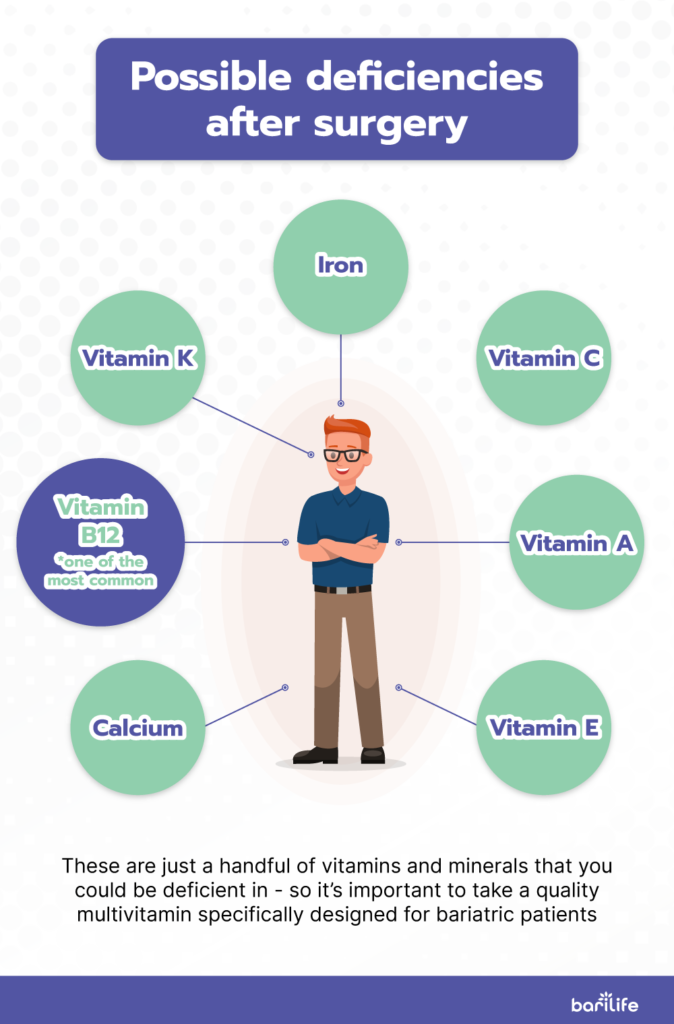
In this article, we are going to discuss vitamin B12, signs and symptoms of a deficiency, and recommendations for supplementation following bariatric surgery. Our hope is that when you finish reading this article you will know when to monitor your B12 levels, how to prevent a deficiency, and be able to identify signs and symptoms related to a deficiency.
What is Vitamin B12?
Vitamin B12 is a water-soluble vitamin that plays a vital role in your central nervous system and the formation of red blood cells. Another common name for vitamin B12 is cobalamin because it contains the mineral cobalt.
Vitamin B12 was discovered in 1926 by two physicians George Richard Minot and William Perry Murphy. These two physicians initially studied patients with pernicious anemia and suspected that patients with this type of anemia had a deficiency in nutrients. As a result of this hypothesis, they developed a hallmark study where they gave patients a special diet containing large amounts of liver and found remission of anemia.
Liver is a food that is very high in vitamin B12 and as a result, this vitamin was linked to the remission of pernicious anemia. These two physicians received the first Nobel Prize related to vitamin B12 because of this study.
The discovery of vitamin B12 and the understanding of its role in the human body has occurred in many phases over more than 100 years and has resulted in 2 separate Nobel Prizes. Over the years scientists have found that vitamin B12 is needed to form red blood cells and DNA. It also plays a key role in the function and development of brain and nerve cells.
Simply put, this vitamin is linked to both the formation of blood and the nervous system.
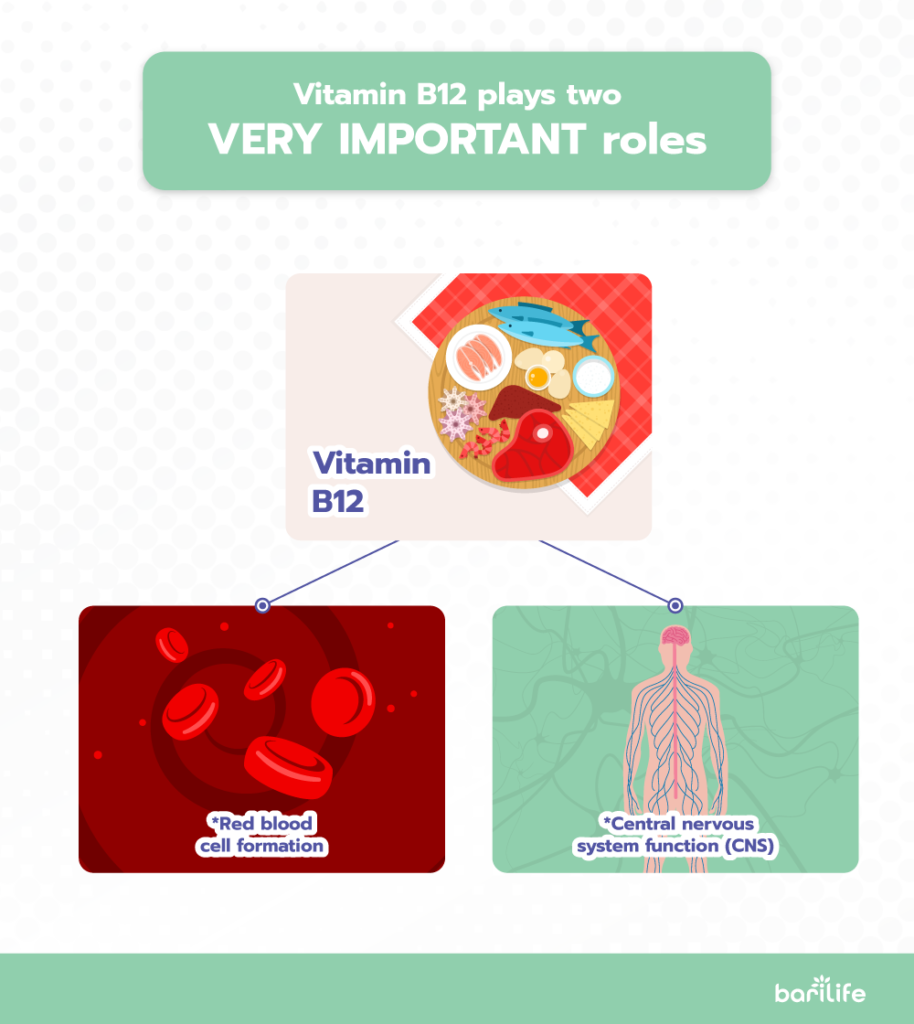
ASMBS guidelines for vitamin B12
As you may be able to tell from the summary above. Vitamin B12 has many important roles in the human body. That is why it is very important to make sure that you are consuming and absorbing the appropriate amount of vitamin B12 throughout your entire bariatric surgery journey.
It is also important to note that the recommendations and guidelines for vitamin B12 change based on what stage of the journey you are in.
Screening
Pre-surgery
Before surgery, it is recommended that a pre-weight loss screening of B12 be performed. This is usually a routine screening and is recommended for all patients.
The prevalence of a B12 deficiency in patients who are overweight is estimated to be about 2-18%. That statistic is slightly increased to 6-30% if you are taking proton pump inhibitors.
Please note that the type of test you take to identify a vitamin B12 deficiency matters. Serum B12 levels alone may not be adequate to identify a deficiency in B12.
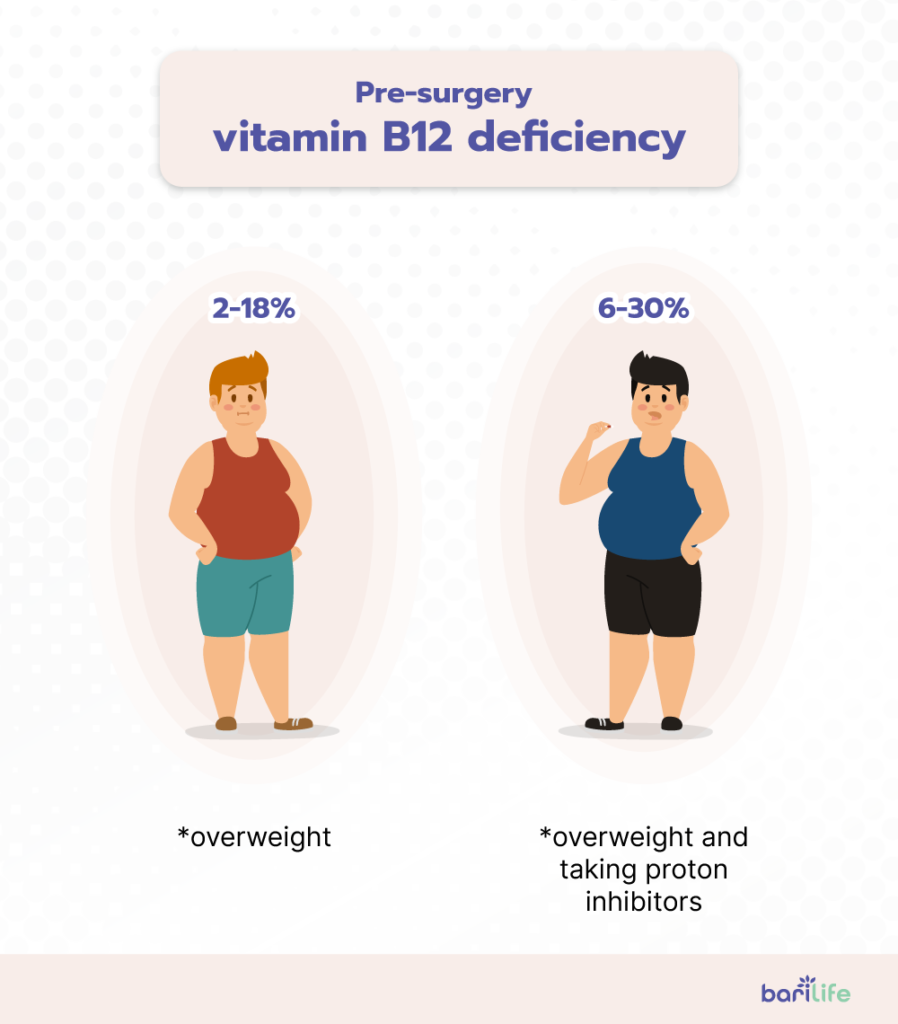
Serum methylmalonic acid (MMA) is the recommended assay for B12. Elevated MMA levels (Values 40.4 mmol/L) are considered to be a more reliable indicator of B12 status. This is because the serum MMA can be an indicator of metabolic change that is highly specific to a B12 deficiency.
Post-surgery
Following bariatric surgery, screening of vitamin B12 status is recommended. Post-WLS screening is recommended for all patients who have undergone Roux-en-Y gastric bypass (RYGB), sleeve gastrectomy (SG), or Biliopancreatic diversion/duodenal switch BPD/DS.
In the first year following bariatric surgery, it is recommended that you get screened for a B12 deficiency every 3 months. After the first year, it is still recommended to get screened but not as frequently. You will need to get screened annually or as indicated by your doctor.
Certain medications may increase your risk of a B12 deficiency. These include nitrous oxide, neomycin, metformin, colchicine, proton pump inhibitors, and seizure medications. If you are taking any of these medications, be sure to communicate with your physician and continue regular screenings as recommended by your physician.
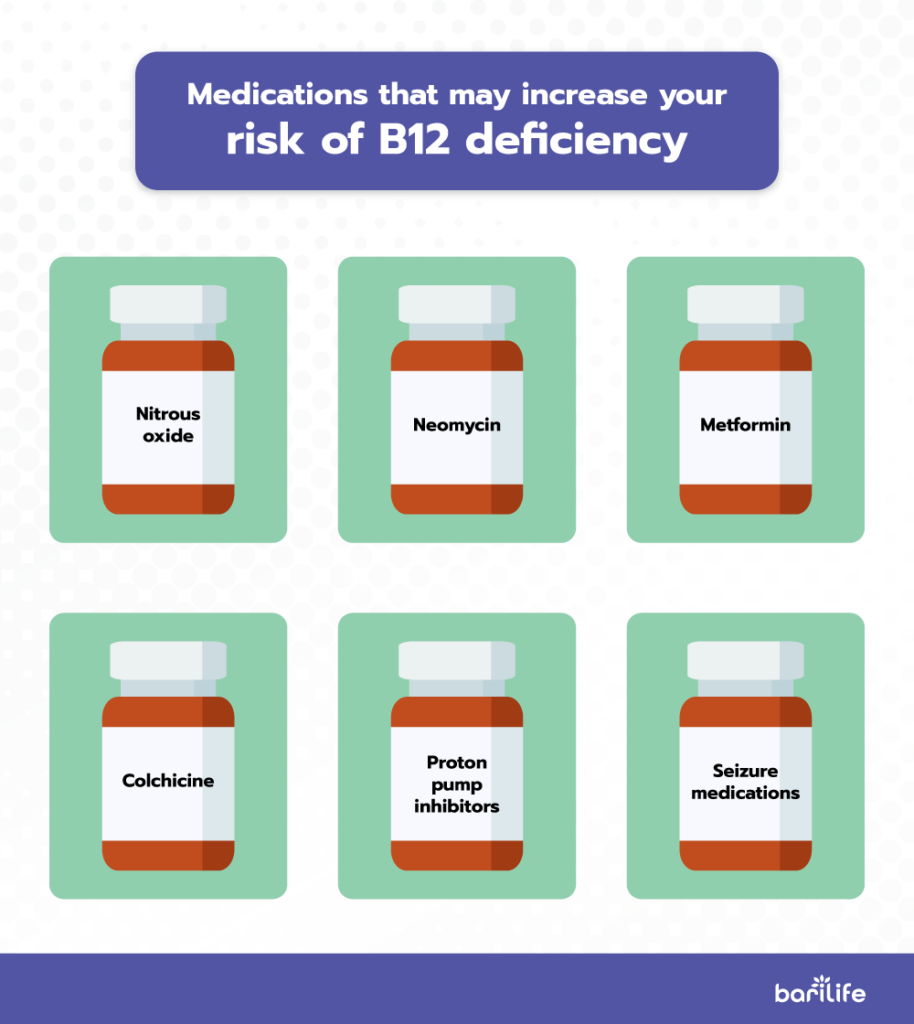
There is a high prevalence of vitamin B12 deficiencies in post-weight loss surgery patients. 2-5 years after the RYGB the prevalence of B12 deficiencies in patients is estimated to be about 20% and following the SG it ranges from 4-20%.
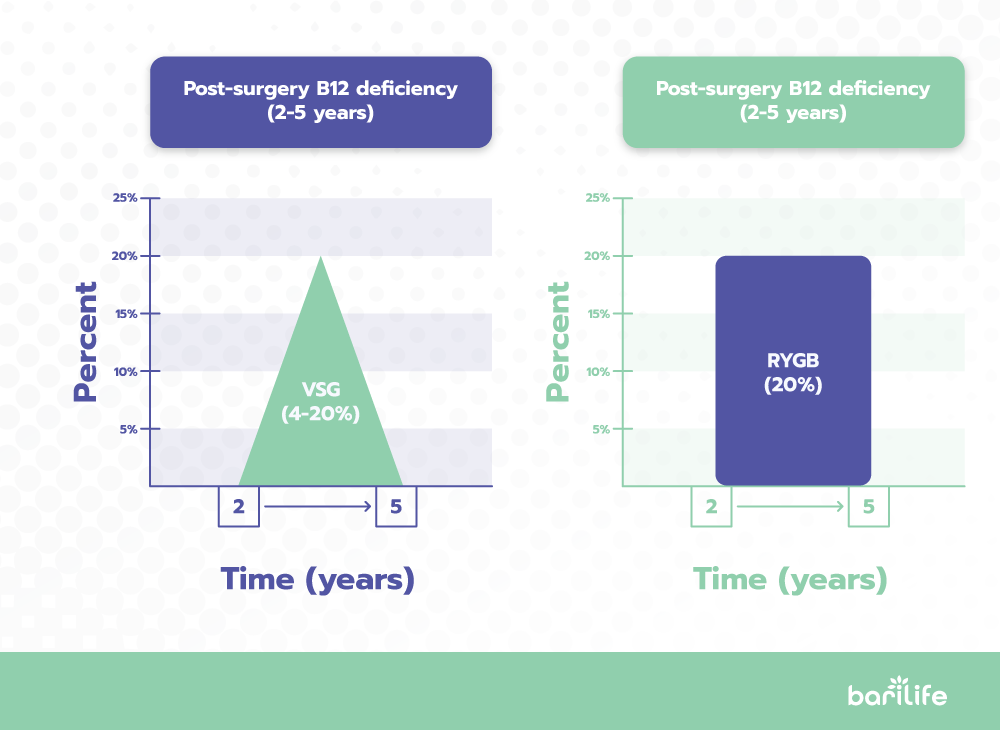
Supplementation
Vitamin B12 deficiency can occur due to food intolerances, malabsorption, or restricted intake of protein and vitamin B12–containing foods. Weight loss surgery (WLS) can lead to malabsorption of vitamin B12 and that is why it is recommended that patients who have had bariatric surgery take vitamin B12 supplements.
According to the ASMBS, all post-WLS patients should take vitamin B12 supplementation.
Supplement dose for vitamin B12 in post-WLS patients varies based on the route of administration:
- Orally by disintegrating tablet, sublingual (under the tongue), or liquid: 350–500 mg daily
- Nasal spray as directed by manufacturer
- Parenteral (IM or SQ): 1000 mg monthly
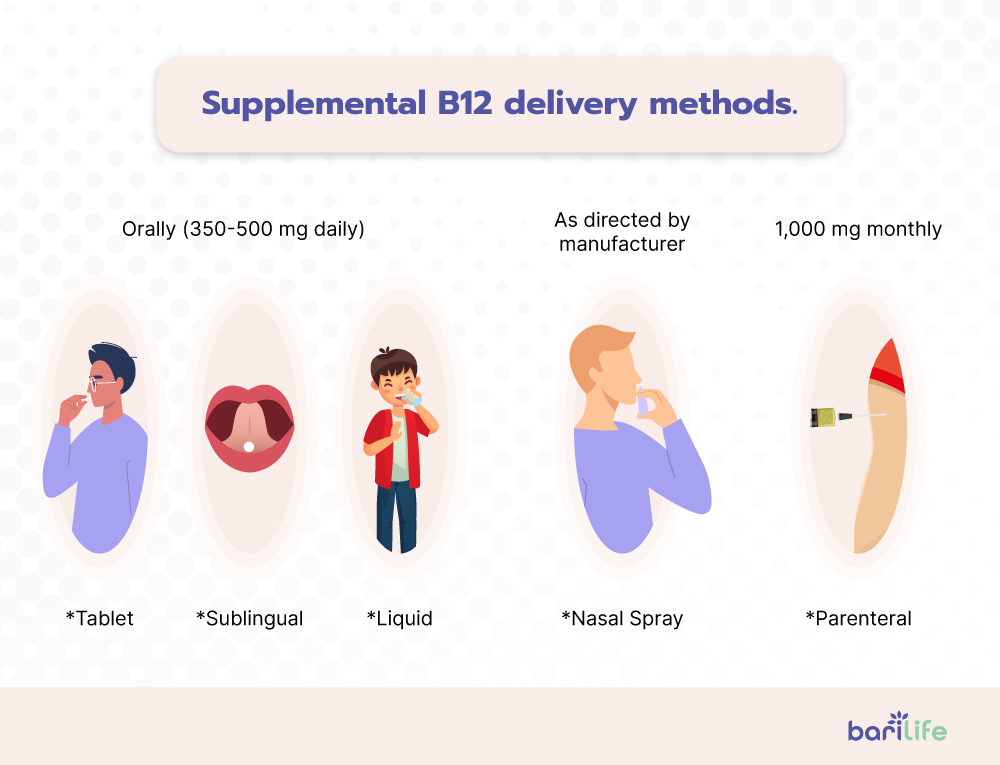
Post-WLS patients with B12 deficiency should take 1000 mg/d to achieve normal levels and then resume dosages recommended to maintain normal levels.
Vitamin B12 supplements can come in many forms and the dosage differs between them. Two of the most common forms of vitamin B12 supplements include cyanocobalamin and methylcobalamin.
Cyanocobalamin: is a synthetic form of vitamin b12 that is not found in nature. This form of vitamin B12 is not in its active state until it enters your body and then it is converted to an active form.
Methylcobalamin: or methylated B12 is a form of vitamin B12 that is already in its active state. This form of vitamin B12 is naturally occurring and can be found in both food and supplements.
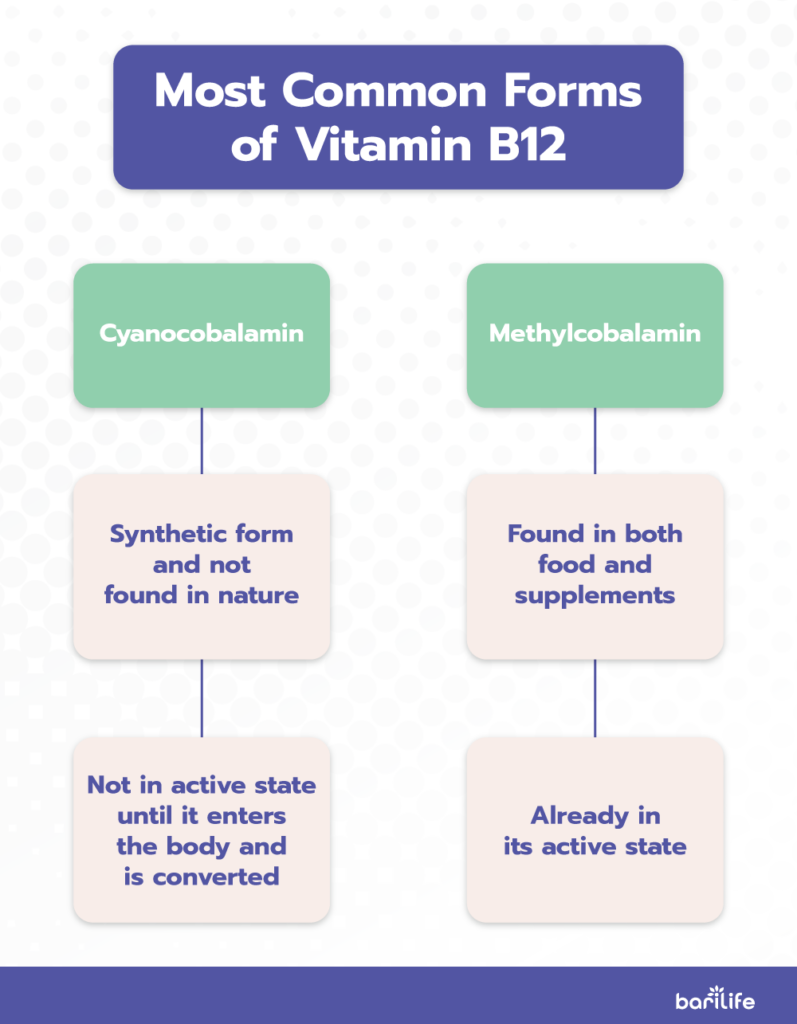
So, you may be wondering which form of vitamin B12 is better? Well, that depends on what you are looking for and your unique needs related to vitamin B12.
Studies suggest that cyanocobalamin is absorbed in the body slightly better than methylcobalamin at the same dosage. However, research suggests that cyanocobalamin is excreted or lost at a rate 3 times faster than methylcobalamin.
So this may suggest that methylcobalamin, although it is absorbed at a lower rate, may be retained in the body better and longer than cyanocobalamin.
There is limited research on the difference and efficacy of these two vitamins and certain factors like age and genetics may play a role in how you react to these two forms of vitamin B12.
Signs, symptoms, and complications that can arise when you are deficient in vitamin B12
Symptoms of a vitamin B12 deficiency can include Pernicious anemia or megaloblastic anemia and Nervous system problems:
Pernicious anemia or megaloblastic anemia:
- Being pale with slightly icteric skin and eyes,
- Magenta or “beefy red” tongue (glossitis)
- Fatigue
- Anorexia
- Diarrhea
Nervous system problems:
- Numbness and paresthesia (tingling or prickly feeling) in extremities
- Ataxia (poor muscle coordination)
- Changes in reflexes
- Demyelination
- Axonal degeneration, especially of peripheral nerves, spinal cord, and cerebrum
- Light-headedness or vertigo
- Shortness of breath
- Ringing in ears (Tinnitus)
- Palpitations or rapid pulse
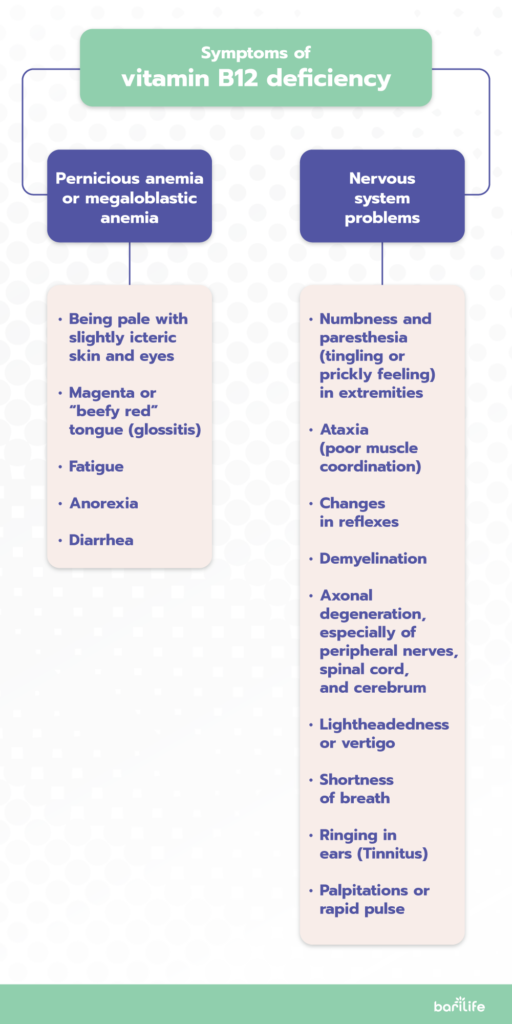
Vitamin B12 in the diet
Vitamin B12 is primarily found in animal products:
- Beef Liver
- Beef
- Lamb
- Pork
- Goat
- Turkey
- Milk
- Goat milk
- Yogurt
- Cheese
- Eggs
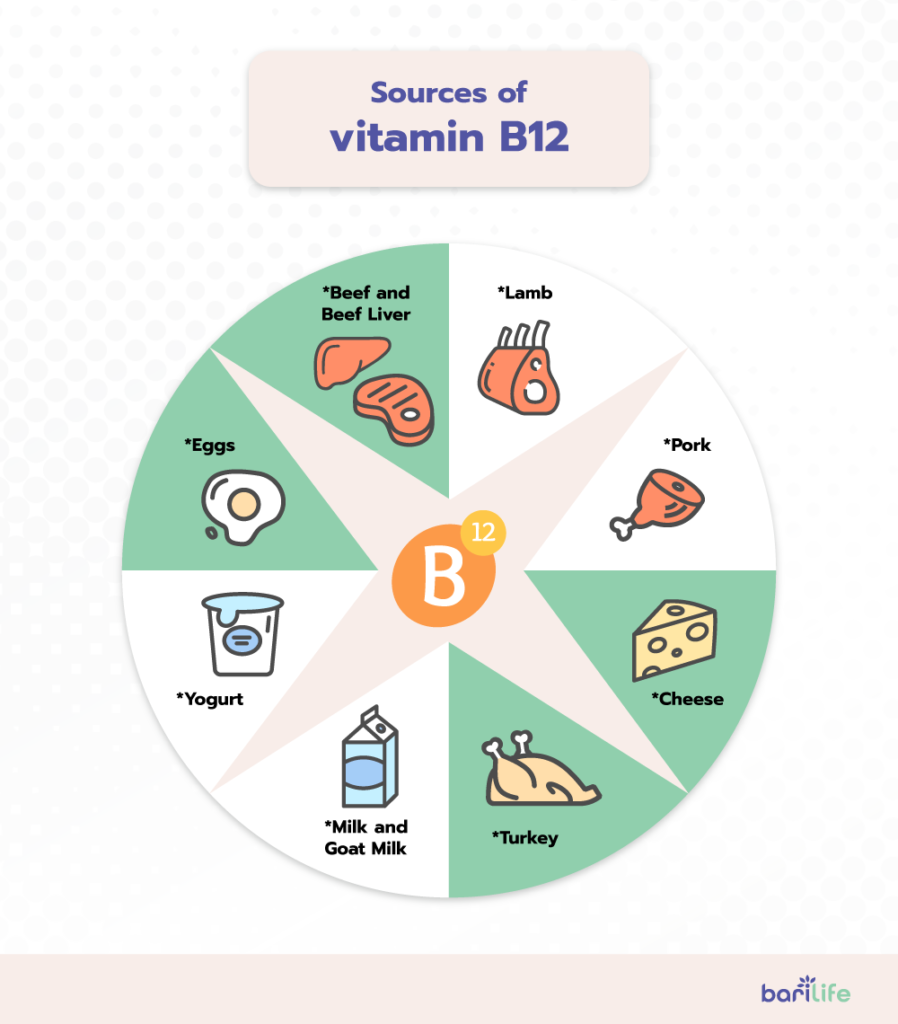
Most food items high in vitamin B12 come from animal sources. If you are looking for some alternatives because you want to add more vitamin B12 or if you don’t eat foods derived from animals, then here are some alternatives.
It’s important to note that some of these items are fortified with vitamin B12 meaning that the B12 is added into the food. If you are looking to buy these foods to increase your vitamin B12 intake, then be sure to read the food labels to know if the item is fortified with B12.
Vegan sources of vitamin B12 include:
- Nutritional Yeast
- Marmite + Yeast spreads
- Fortified soy + almond milk
- Plant-based meats
- Fortified cereals
- Tempeh
- Chlorella
- Nori seaweed
- Cremini mushrooms
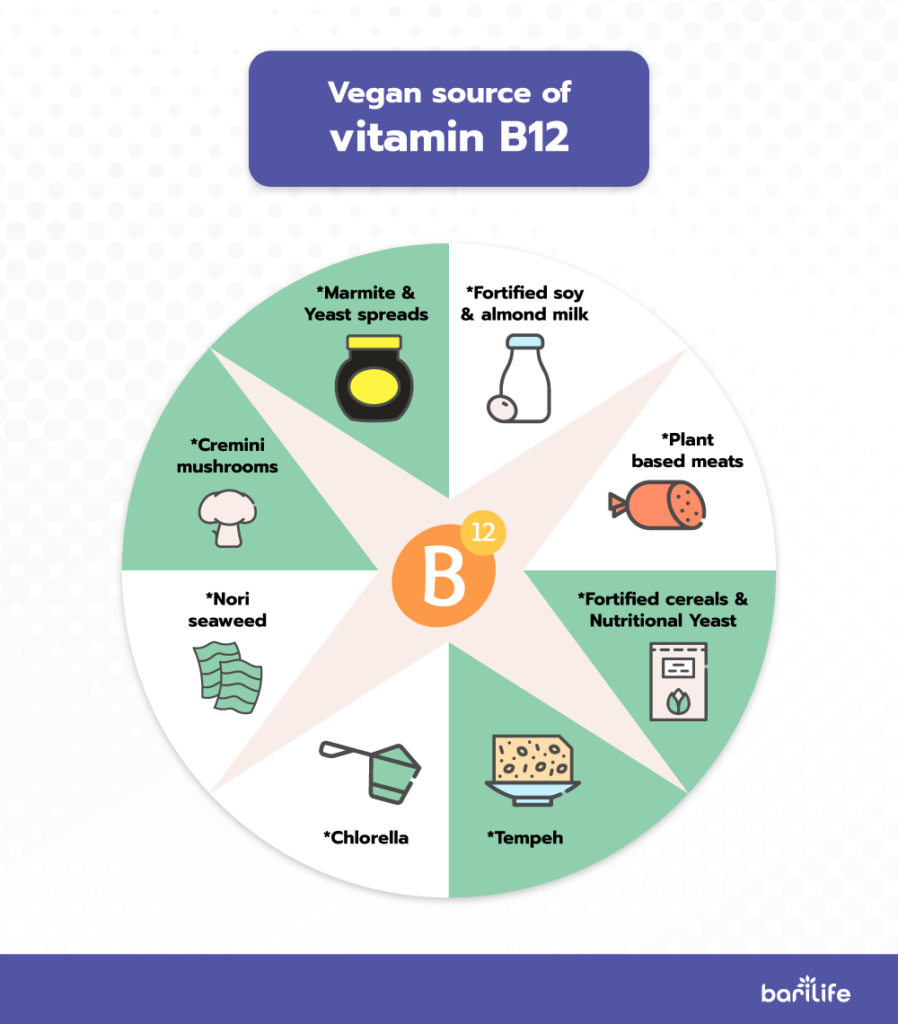
Looking for the perfect supplements to meet your vitamin needs?
Look no further! Bari Life vitamins are exactly what you need.
Even with a diet high in vitamin B12 patients following bariatric surgery face difficulties with nutrient absorption meaning that you may be consuming the right amount of nutrients, but your body is not absorbing them well enough, and you can likely still be deficient.
Taking a multivitamin specifically tailored to the needs of bariatric patients can help to prevent nutrient deficiencies including a vitamin B12 deficiency.
Visit our website to learn more about multivitamins tailored specifically for bariatric patients!




What are your tips and tricks to post-bariatric success?